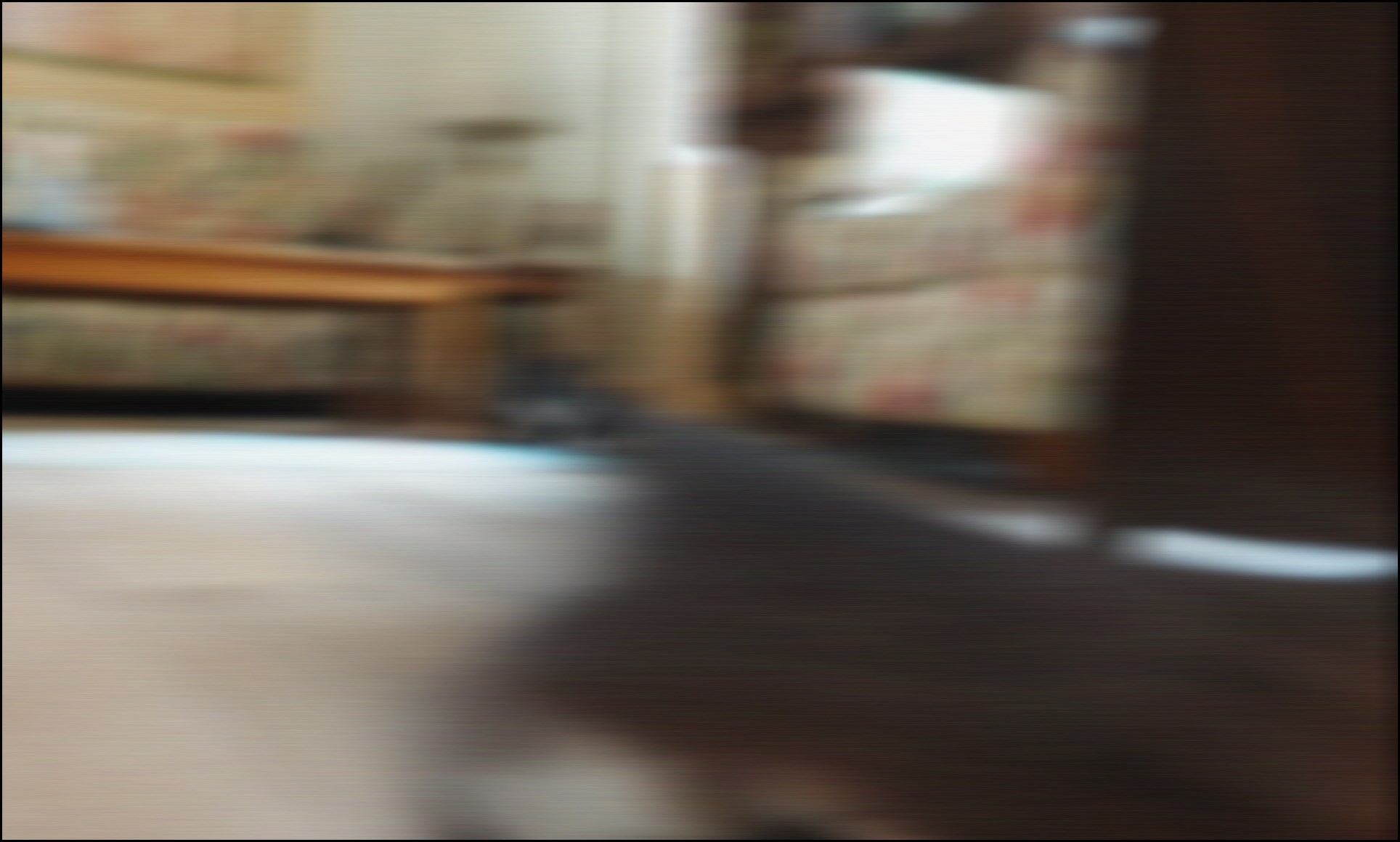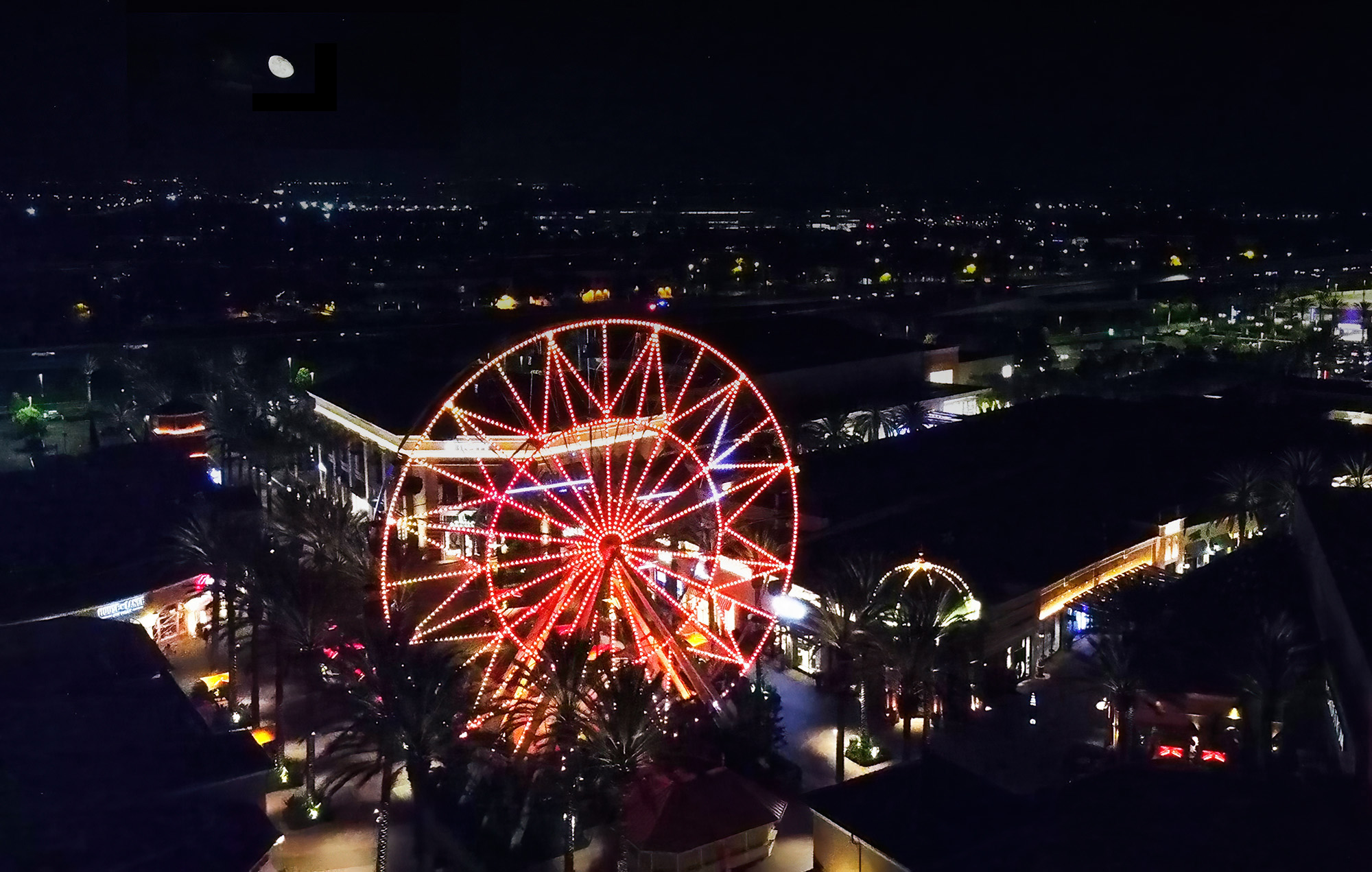Apologies for the lack of posting this morning. I've been engaged in a vitally important photographic mission trying to identify a strange blur that showed up in our house a couple of days ago. So far I've not had much luck, but I'll keep trying.
The economy is doing better than we thought
Hmmm. We have a lot more jobs than we thought:
In the most recent four months with revisions, June through September, the Bureau of Labor Statistics (BLS) reported it underestimated job growth by a cumulative 626,000 jobs — that’s the largest underestimate of any other comparable period, going back to 1979. If those revisions were themselves a jobs report, they’d be an absolute blockbuster.
This is a bit of a pattern. The Afghanistan withdrawal turned out to be a lot better than we initially thought based on the disasters of the first day. The economy is better than we initially thought based on early prints of the jobs reports. The infrastructure bill is good stuff but has to overcome the initial political infighting that slowed it down.
That's bad luck for the Biden crew. But better than the other way around, I suppose.
Lunchtime Photo
Republican hysteria over the economy has reached record levels
The latest edition of the Survey of Consumer Sentiment is out, and it shows that Republicans have doubled down on their hysteria over the economy:
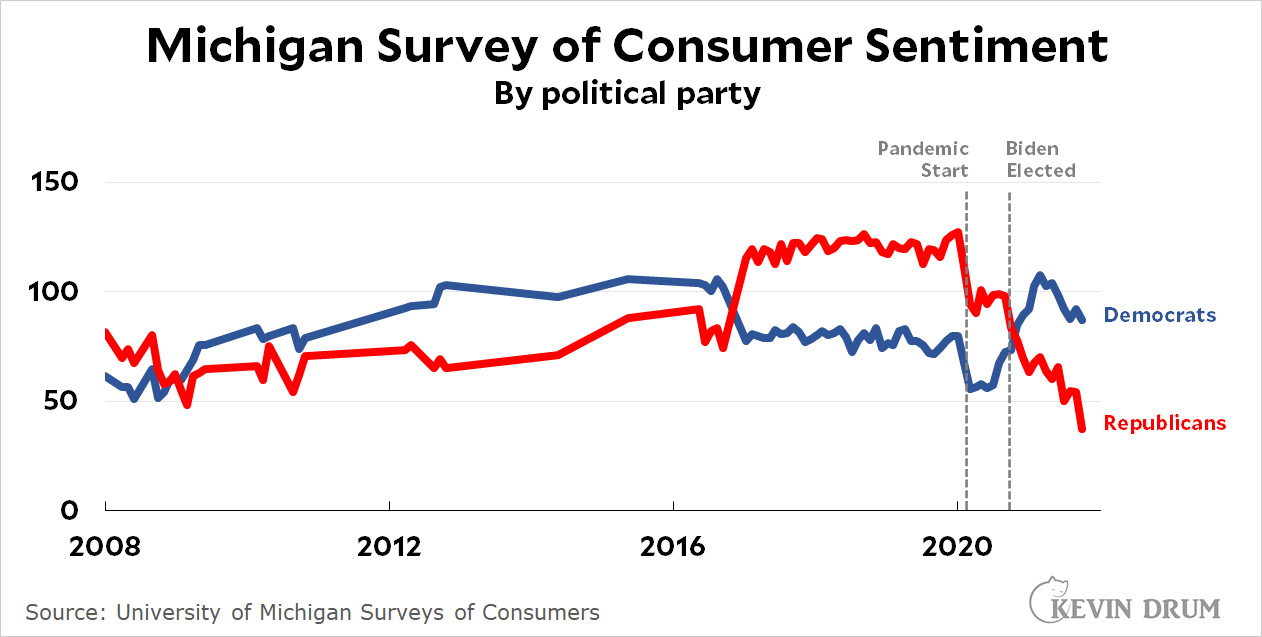 At the start of the pandemic, everyone naturally became pessimistic about the economy. But after a few months, as assistance started to roll out, sentiment stabilized.
At the start of the pandemic, everyone naturally became pessimistic about the economy. But after a few months, as assistance started to roll out, sentiment stabilized.
Until November 3rd. Sentiment among Democrats had already been going up, and it continued rising until the middle of 2021, when it took a modest downward dip.
But Republicans went cuckoo when Donald Trump lost the presidential election. Consumer sentiment plummeted, and kept plummeting for over a year. In November it came in at 37.2, the lowest it's ever registered.
By far the lowest. Lower than the 1980 Carter recession (55.1) and lower than the Great Recession (48.3).
This is nuts, given the extensive real-world evidence that the economy is in pretty good shape. It only makes sense if you've been repeatedly hammered over the head that deficits and inflation are the only things that matter and they're all set to crush the economy any day now.
But where would anyone get that idea?
REDS THREATEN US ASTRONAUTS!
I accidentally got a copy of the Orange County Register today instead of my usual LA Times, and on page A10 there's a short AP dispatch headlined "Russia gets blamed for threatening space junk." This was due to a Russian missile destroying an old satellite and creating a huge cloud of debris that posed a danger to the International Space Station.
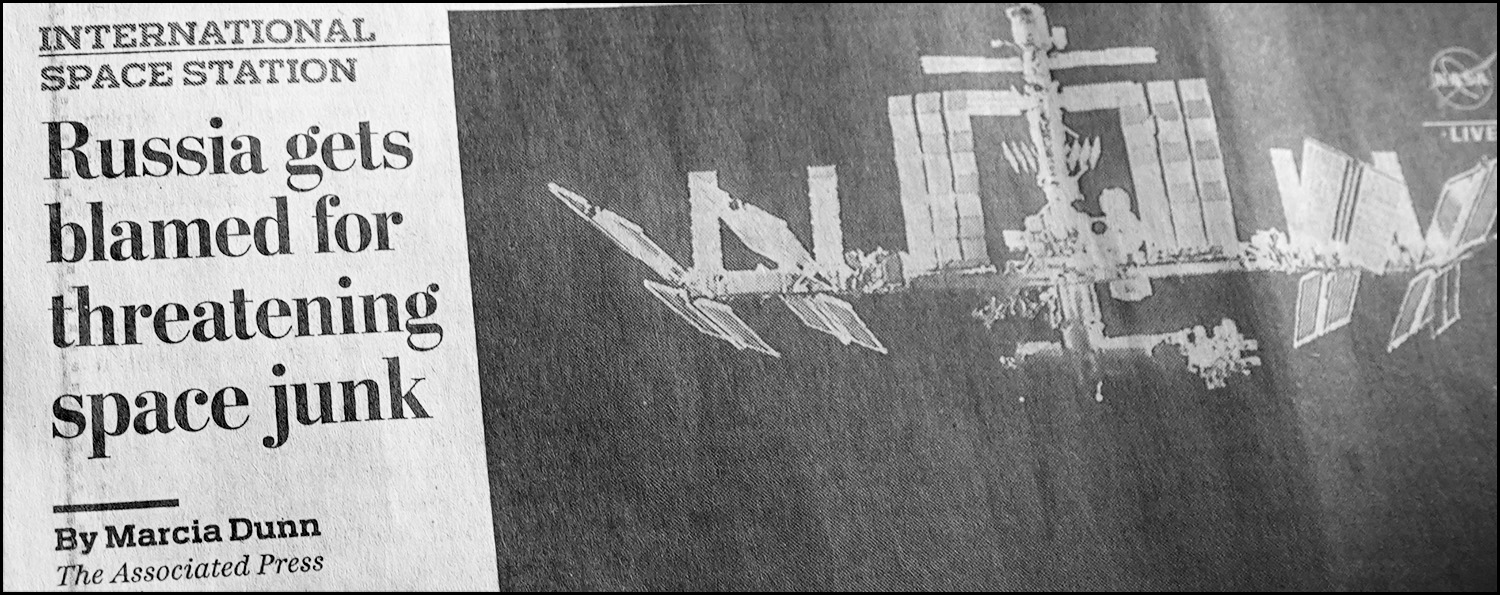 What a disappointment. That headline is so bland. So weak. So appease-y. Back in the day, it would have been the front page lead story and it would have been headlined, "REDS THREATEN US ASTRONAUTS."
What a disappointment. That headline is so bland. So weak. So appease-y. Back in the day, it would have been the front page lead story and it would have been headlined, "REDS THREATEN US ASTRONAUTS."
Only oldsters will get this joke, but that's OK. We oldsters have a thousand more like this, which I suppose is why we take Fox News so seriously but remain a little less troubled by social media.
POSTSCRIPT: Joking aside, wtf Russia? What's the deal behind pulling an insane stunt like this?
We are merrily spending, spending, spending
Retail spending was up in October:
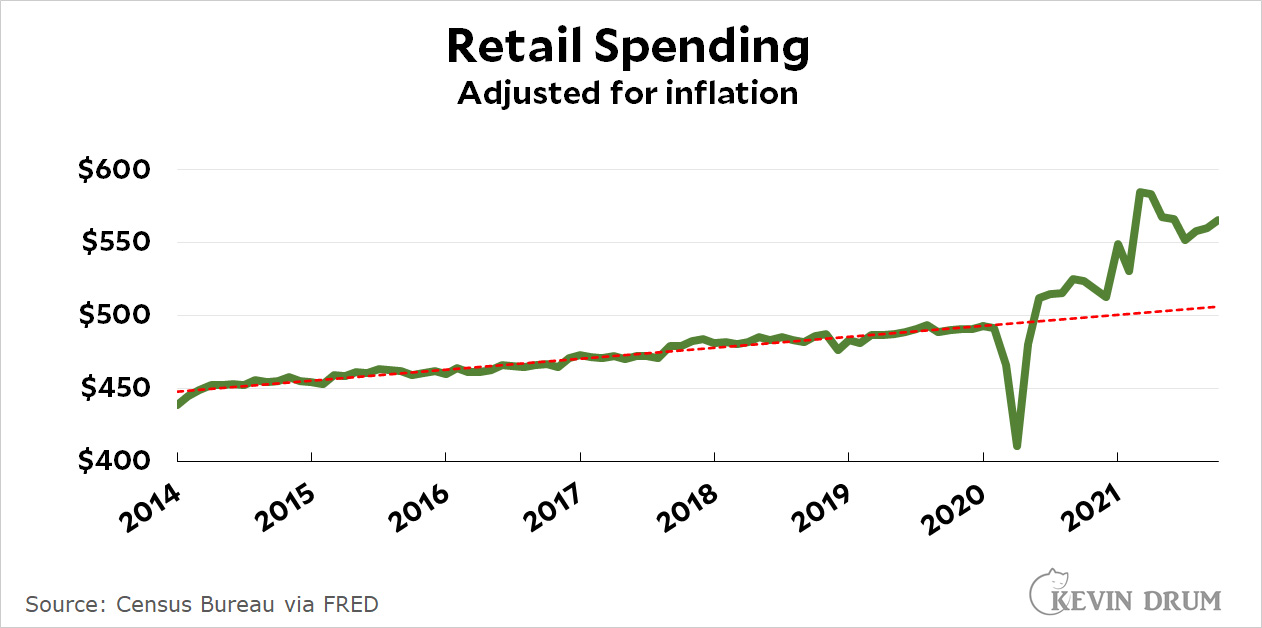 This is yet another indicator that the economy is still running hot and will probably continue to do so as long as savings remain high and stimulus money is coursing through the nation's households.
This is yet another indicator that the economy is still running hot and will probably continue to do so as long as savings remain high and stimulus money is coursing through the nation's households.
How long will this last? I don't know, but I'd take a horseback guess that $2 trillion might take a year or so to burn itself out. In other words, high spending and the resulting high inflation might well last until March of 2022 or so.
Just a guess!
Here’s a weird puzzler about beef and pork production
I was looking up the figures for meat production earlier this evening and I ran across something puzzling:
 The volume of beef and pork produced follow each other almost perfectly. I can't think of any reason for them to be tied so closely together. What's going on?
The volume of beef and pork produced follow each other almost perfectly. I can't think of any reason for them to be tied so closely together. What's going on?
POSTSCRIPT: This chart also shows that the production of beef and pork seems to be pretty steady over the past year. So why do we keep hearing about shortages, and why is the wholesale price of beef and pork so high?
According to the USDA, the farm price of beef is up 16% over the past year while the retail price is up 24%. But why? Is it really just higher feed costs?
Want votes? You need to sell yourself.
This is anticipating things a bit, but voters might get a bit annoyed if you trumpet the great things you did but it doesn't come online for years, and is underfunded (so not real) when it does.
Or, I dunno, maybe The Left is to blame.
I don't get this. Big, complex programs almost never come online within a few months. That's just the way it is. Why do people complain about this constantly?
And even when they do come online fast, does it matter? The expanded Child Tax Credit started flowing almost immediately; it was nearly universal; and it was straight-up cash in people's pockets. But as near as I can tell, it elicited a big meh from voters, most of whom never really realized that it was a Biden program anyway.
Donald Trump had the right idea on this stuff: Don't worry about all the fussy details, like whether the program actually works or not. Just boast about it to the skies, and keep doing it every time you open your mouth. Eventually people will believe the story, not the reality.
Lunchtime Photo
I order enlargements of my best pictures and display them on an upstairs wall. Every month or two I order a new one and rotate it into the display, and for the past several months I've been rotating in only black and white photos.
That process is complete, and I now have a display of just black and white pictures. It's hard to do black and white well, but it's fun to try and I think I'm getting a little better at it.
In another month or so I'll start rotating new pictures in, and the display will once again be a combination of color and monochrome. Until then, enjoy the grayscale.

Is high inflation happening only in the United States?
As long as we're on the subject of inflation, a reader emails to ask whether high inflation is a global problem or a purely American one. For starters, here is inflation in the US and Europe:
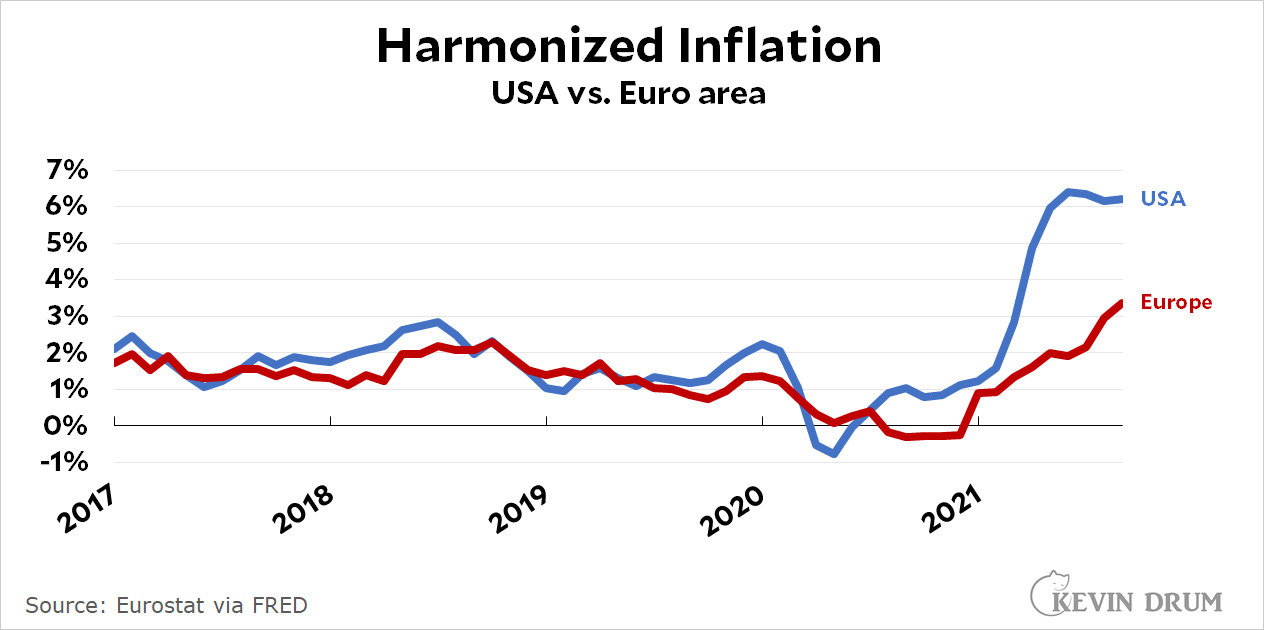 One thing to notice is that this is "harmonized" inflation. Every country has a slightly different way of calculating inflation, so Eurostat performs some statistical magic to bring them all into line and make them comparable. That's why the US figures look a little different than the ones you usually see. Eurostat thinks the US hit a 6% inflation rate back in May and has been pretty steady ever since. Euro-area inflation, by contrast, is still low but appears to be climbing.
One thing to notice is that this is "harmonized" inflation. Every country has a slightly different way of calculating inflation, so Eurostat performs some statistical magic to bring them all into line and make them comparable. That's why the US figures look a little different than the ones you usually see. Eurostat thinks the US hit a 6% inflation rate back in May and has been pretty steady ever since. Euro-area inflation, by contrast, is still low but appears to be climbing.
Take that for what it's worth. A few months from now things might look very different.
The main takeaway, however, is that in March US inflation started to pull away from Euro-area inflation. Why? Paul Krugman dedicated an entire column to this question and concluded that it was a mystery. And if it's a mystery to Krugman, who am I to have an opinion?
But let's throw caution to the wind and offer up the obvious answer: in the US we passed a $900 billion stimulus bill in December and then followed it up with a $1.9 trillion stimulus bill in March. That's a lot of money to dump into the economy, and seems plenty sufficient to touch off a round of inflation. European countries mostly didn't do this because they already have safety nets that take care of people during things like recessions and pandemics.
So that's my answer, anyway. It's also why I continue not to be too worried about high inflation. We pumped $2.8 trillion into the economy, and it's no surprise that it produced some inflation. However, that was a one-time event. Once that money works its way through the economy, inflation will fade away naturally.
That's just my two cents. Remember, though, I Am Not An Economist.¹
¹Not that economists seem to be doing any better on this question...

